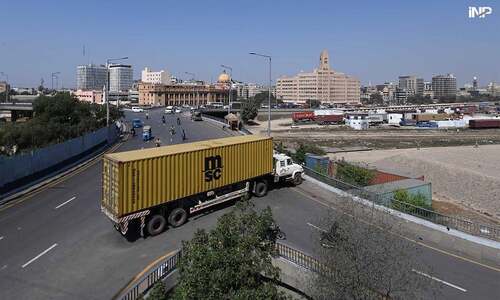KARACHI: It is time for all stakeholders to come together for joint efforts against child trafficking, sexual abuse and child labour and make such offences non-bailable and non-compoundable to eradicate increasing number of such cases.
This was one of the key takeaways from the seminar tilted Provincial Stakeholders’ Dialogue on Combating Child Trafficking and Bonded Labour in Sindh, jointly organised by the Sindh Human Rights Commission (SHRC) and the Sustainable Social Development Organisation (SSDO) here at a local hotel.
The speakers at the event included Iqbal Ahmed Detho, chairperson of SHRC, Senator Ayesha Raza Farooq, chairperson of the National Commission on the Rights of the Child (NCRC), Sarah Ahmed, chairperson of the Punjab Child Protection and Welfare Bureau (CPWB), Syed Kausar Abbas, executive director of SSDO, DIG East Azfar Mahesar, Arshad Mehmood, chairperson of Economic Council Employers Federation of Pakistan and Reejhu Mal Sanjnani, senior law officer at labour department.
Senator Ayesha Raza said the recent cases of Fatima Farro, Rizwana and others clearly showed how much work needed to be done in this regard.
Speakers urge authorities to make child abuse, trafficking non-bailable offences
She added that there was no national law to control domestic child labour in the country apart from the clause that sets age limit for a labourer.
She further said the crimes of domestic child abuse, trafficking and bonded labour should be made non-bailable and non-compoundable offences in order to hold the culprits accountable, especially the powerful people, along with ensuring their conviction.
Mr Abbas said child trafficking and child abuse along with child labour were organised crime and, therefore, a joint action plan was needed to tackle them. Efforts by one or two institutions or departments would not be effective in curbing this menace, he added.
Highlighting the similar issue, Mr Mahmood said that more work needed to be done on preventive measures against such crimes rather than just working on controlling measures.
He added that for this purpose, private sector’s efforts and partnership with the government sector was necessary.
Chairperson of CPWB Sarah Ahmed said child labour had become a business for many and parents used their children as commodities.
“There are parents who choose to have more many children so that they could have more workers to earn money,” she said.
Mr Sanjnani of labour department said child labour happened mainly in the informal sector, like agriculture, domestic work, etc, and it was difficult to control it for that very reason as there was no existing mechanism for this.
However, he added that the department was working on making required laws.
DIG Mahesar said police was the main stakeholder and had the most important role to play in controlling all these crimes and that they were making the system of complaints registration smooth as well as trying to ensure conviction of those involved in such crimes.
Admitting lack of legislation, chairperson of SHRC Iqbal Detho said there was a lot of work to do in legislation for child trafficking and abuse along with addressing lacunae in the existing laws as there were many ambiguities in them and, adding that the department was working in this regard.
Published in Dawn, October 4th, 2023





























